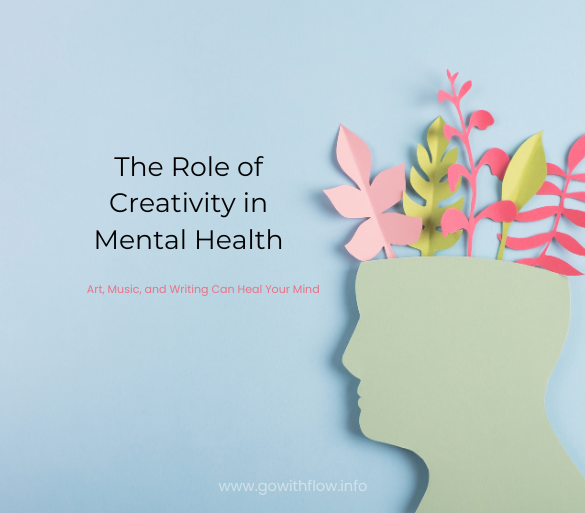In a world that often feels fast-paced and overwhelming, finding ways to manage mental health is more important than ever. While traditional therapies like counseling and medication are essential for mental well-being, creative outlets such as art, music, and writing have proven to be incredibly effective in supporting mental health. These creative forms of expression offer a way to process emotions, reduce stress, and improve overall mental wellness.
Here’s a closer look at how creativity in various forms can play a powerful role in healing the mind.
Art as a Tool to Expression Your Emotions and Feelings
Art therapy is one of the most well-known ways that creativity can aid mental health. When people engage in creating visual art—whether it’s drawing, painting, sculpting, or even coloring—they tap into a unique way to express feelings that may be hard to articulate with words. This process can provide clarity and release pent-up emotions, offering an outlet for frustration, sadness, or joy.
How Art Helps to Heal Our Mind:
Reduces Stress: Engaging in art allows individuals to focus on the creative process, which can help distract from stressors and provide relaxation.
Encourages Self-Expression: Sometimes, words can’t fully capture our emotions. Art allows individuals to express themselves without needing to rely on language, helping them process complex feelings.
Boosts Self-Confidence: Completing a piece of artwork can instill a sense of accomplishment and pride, helping boost self-confidence and self-worth.
Whether you’re creating abstract works or simply doodling in a sketchbook, art provides a safe space to explore emotions and enhance mental well-being.
Music: Know The Healing Force for the Mind of Music
Music has long been recognized as a therapeutic tool for its ability to impact mood and emotions. Listening to music can influence how we feel, helping to calm anxiety, uplift sadness, or energize low spirits. Creating music—whether playing an instrument, singing, or composing—can have similar mental health benefits.
How Music is Helpful in Stress:
Mood Regulation: Upbeat tunes can lift spirits, while slower, softer music can help relax the mind. Music provides an emotional release, helping to shift negative thoughts and feelings.
Enhances Emotional Processing: Just like art, music allows individuals to express emotions that may be difficult to verbalize. Many people use music as a way to reflect on personal experiences or to work through grief or trauma.
Reduces Anxiety: Music has been shown to lower cortisol levels, the stress hormone, which helps reduce anxiety and promote relaxation.
Listening to your favorite songs, learning an instrument, or even composing your own music can provide emotional relief and therapeutic benefits.
Writing: The Power of Words for Healing
Writing is another powerful form of creative expression that can significantly benefit mental health. Journaling, poetry, and storytelling provide individuals with a safe space to explore their thoughts and emotions. Writing allows the mind to untangle complex feelings and put them into perspective.
How Writing Helps:
Encourages Reflection: Writing helps individuals process their thoughts, encouraging them to reflect on past experiences or current challenges. This process of self-reflection can provide insights that promote healing.
Improves Self-Awareness: Writing can uncover subconscious thoughts and feelings, increasing emotional awareness and helping individuals better understand themselves.
Promotes Mental Clarity: Writing allows individuals to “declutter” their minds, clearing space for fresh perspectives and positive thoughts. It can serve as a free therapeutic tool for managing anxiety, stress, and depression.
Journaling your thoughts or writing poetry can help release bottled-up emotions and reduce stress, offering a healthy outlet for mental clarity and growth.
How to Integrate Creativity into Your Mental Health Routine
The good news is that engaging in creative activities doesn’t require a background in art, music, or writing. Anyone can benefit from creative expression, regardless of skill level. Here are some simple ways to incorporate creativity into your daily routine:
- Start Journaling: Spend 10-15 minutes each day writing about your thoughts, feelings, or experiences. This can help you reflect and gain insight into your emotional state.
- Pick Up an Instrument: Even if you’re a beginner, try learning a simple song on the guitar, piano, or any instrument that interests you. Playing music can be a calming and rewarding experience.
- Try Art Therapy: You don’t have to be a professional artist to benefit from creative expression. Grab a sketchpad, paint, or even adult coloring books to start expressing yourself through art.
- Listen to Therapeutic Music: Create a playlist that helps elevate your mood or soothes anxiety. Use music as a tool to regulate emotions throughout the day.
Conclusion
Creativity is a powerful, natural tool for supporting mental health. Whether through art, music, or writing, creative expression provides a safe and effective way to manage stress, process emotions, and promote healing. By incorporating creativity into your daily life, you can improve your mental well-being, boost your mood, and create a deeper connection with yourself.
The next time you’re feeling overwhelmed or emotionally drained, consider reaching for a paintbrush, a musical instrument, or a pen. You might be surprised at the healing power creativity holds.

